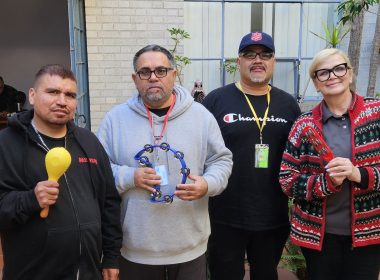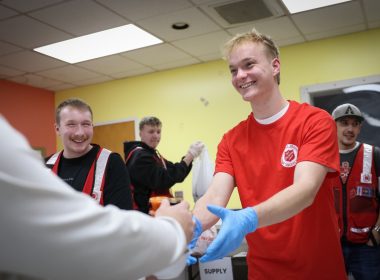Ian Robinson, Major
It was the last day of Officers’ Councils and we were enjoying a group breakfast. As we finished, Lt. Colonel Rose-Marie Leslie stood up and explained that the good-natured banter between her and my wife Isobel was just good fun. Then, without any warning, she asked Isobel to share her journey over the past 18 months with the group.
A few months after we took up an appointment in the United Kingdom, Isobel began a rapid slide into major depression. She had never experienced this before and we could not think of any reason why it should happen now.
At first, we didn’t even realize what it was. Was it a spiritual problem? Seasonal affective disorder caused by the cold and dark English winter we had just experienced? We had no idea. All I knew was that this was not my Isobel. She suffered severe anxiety, could not sleep and was unable to make even the most basic of decisions. She would stand outside the shower for 15 minutes trying to decide whether to have one or not.
Every morning, after waking up, we sat on the bed for two hours or more while I helped her focus and told her over and over again that she would eventually come out of it. She questioned her faith, and even her salvation. She felt disconnected from God and could not engage with people. There were even times when she was afraid she would take her own life. My passionate, driven and energetic wife lost her passion and purpose and just wanted to stay home. Simple things like going to the grocery store terrified her, and the thought that she might be like this for the rest of her life haunted her.
After diagnosing her with major depression, the doctor signed her off work and recommended that she return to the sunshine of Southern California and her family support system. Graciously, the Army agreed and we left our appointment before finishing our term. Isobel says even this added to her pain because she felt as if she had failed.
It took another 10 months of medication, medical and psychiatric help before she came out of the depression. In fact it was hormone replacement therapy that accelerated her recovery. Suddenly, in Rose-Marie’s words, “She’s back!” I praise God for his healing power, and for the medical treatments that have given her back to me.
But during the past few weeks, I began to feel down and withdrawn. My passion and purpose dissipated and I didn’t know what was wrong. Now that Isobel has come back, was I going into a major depression? What was wrong with me?
It was while Isobel was sharing with the officers at breakfast that I made a discovery. For 18 months I have been caring for Isobel night and day, seven days a week. There was no time off and very few moments that were my own. I was constantly on guard and had to maintain a positive attitude no matter how I was feeling inside. We were never apart and she depended on me completely. Now she doesn’t need me anymore. At least, not in the way she needed me during that year and a half. All the intensity of caring for a loved one suddenly has no outlet. I am experiencing caregiver withdrawal.
There must be others who share my experience. Certainly, Isobel is finding many people who are suffering from major depression and are willing to open up because of her transparency. I am equally certain that many people are experiencing caregiver withdrawal after losing a loved one to a long and debilitating disease or after extended periods of caring for someone who suffered from depression or addiction.
We need to talk about it, not cover it up. It’s not something to be ashamed of. We must be transparent and share our problems with a good listener and confidante, and seek medical help if necessary. After all, God’s Word says, Share each other’s burdens, and in this way obey the law of Christ (Gal. 6:2 NLT).










